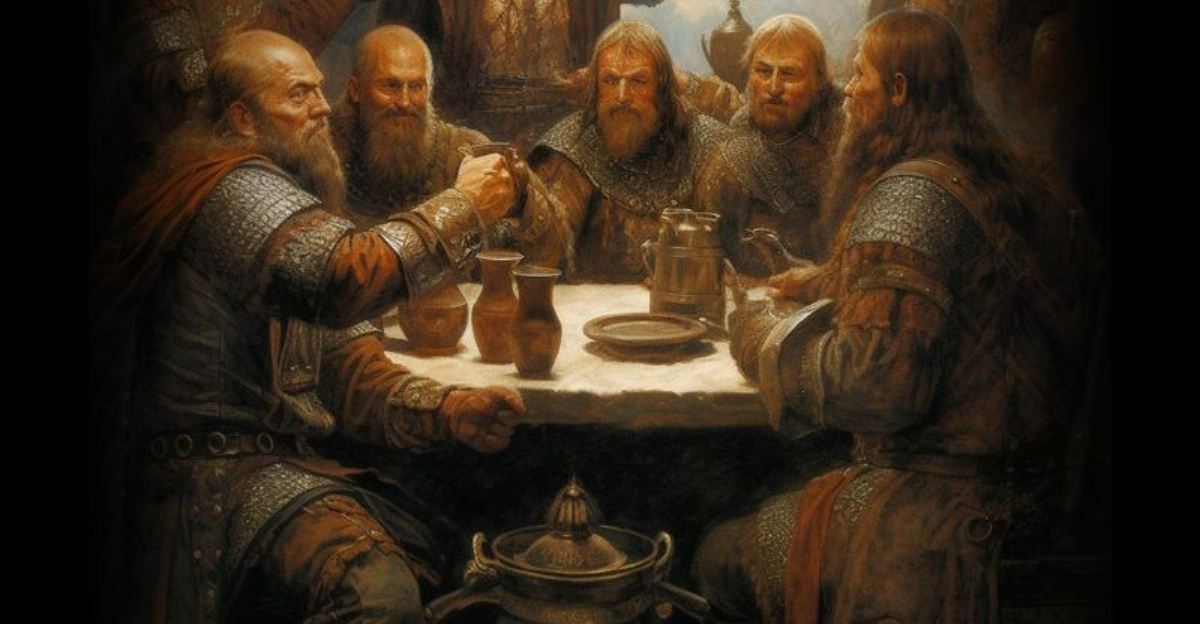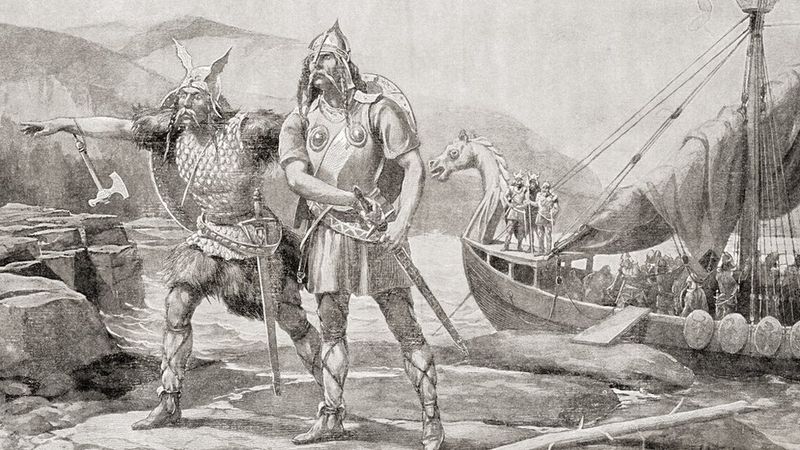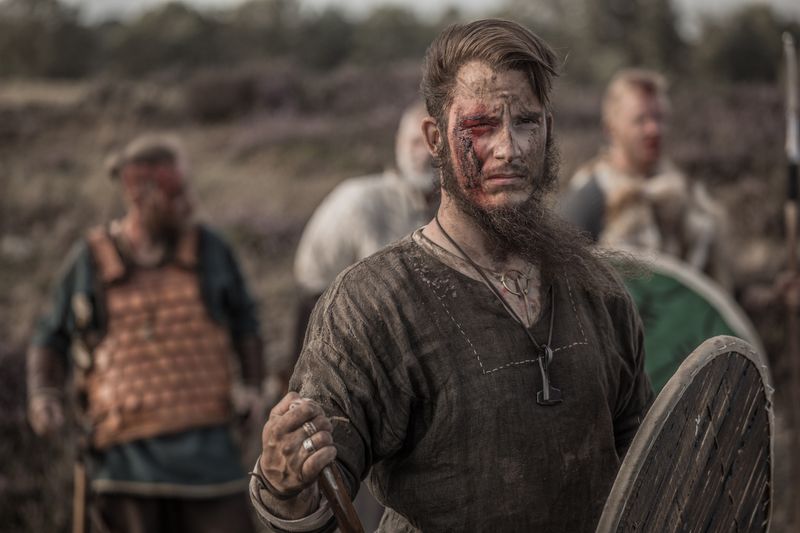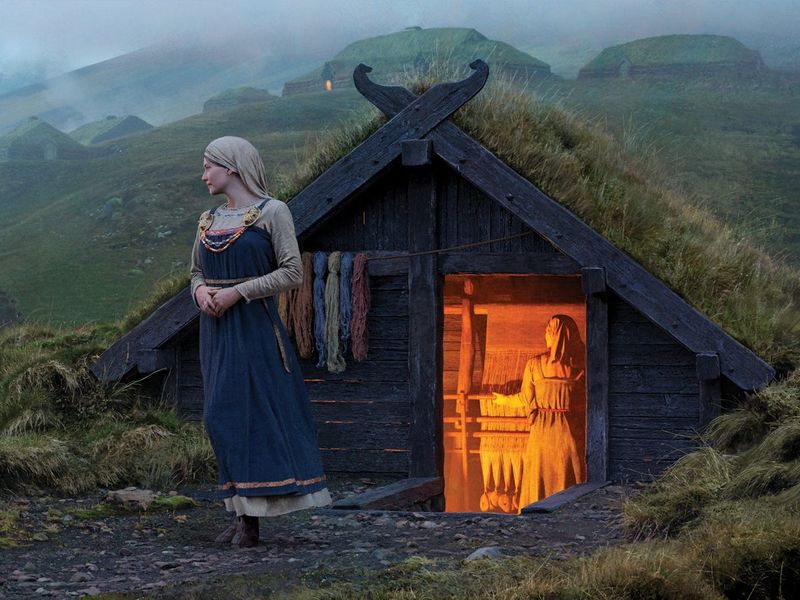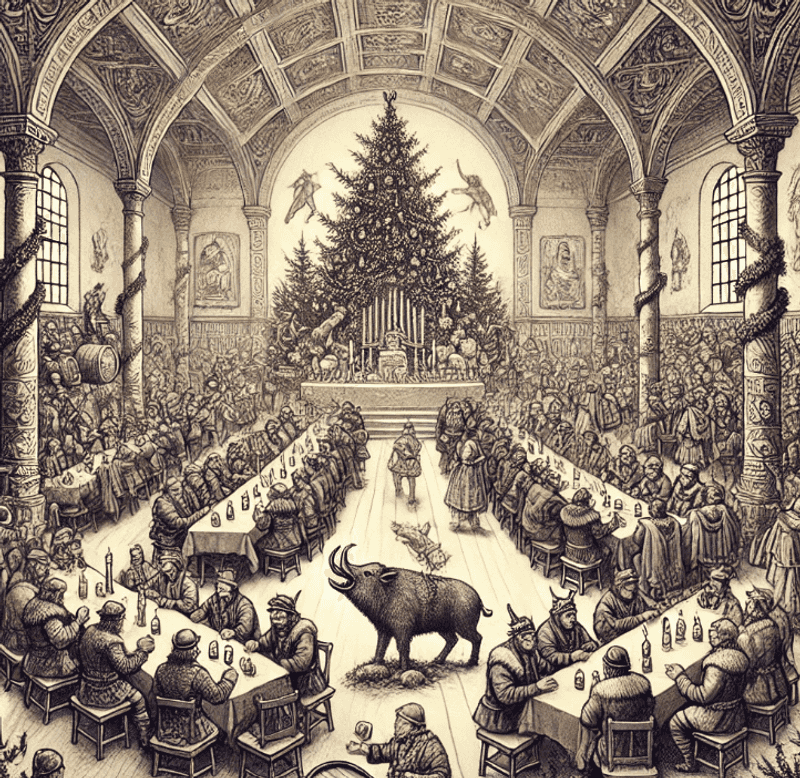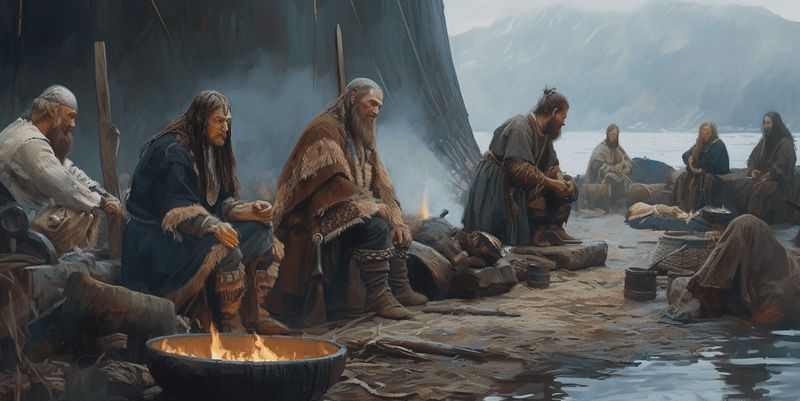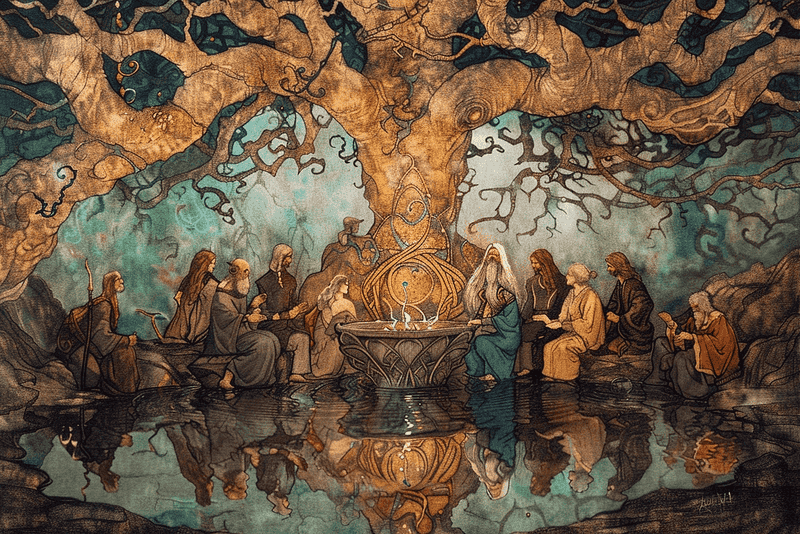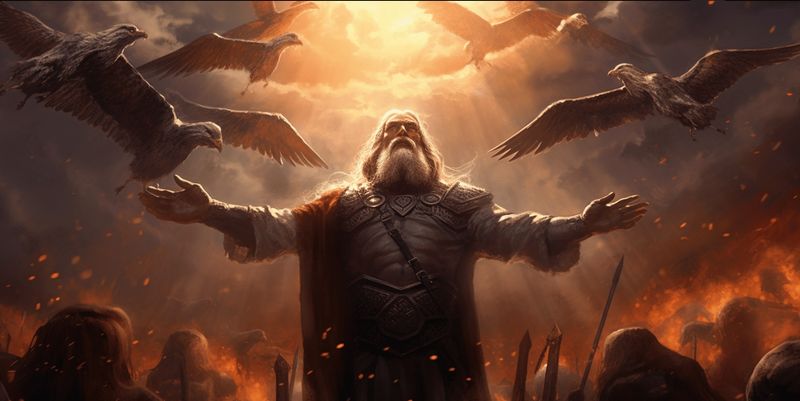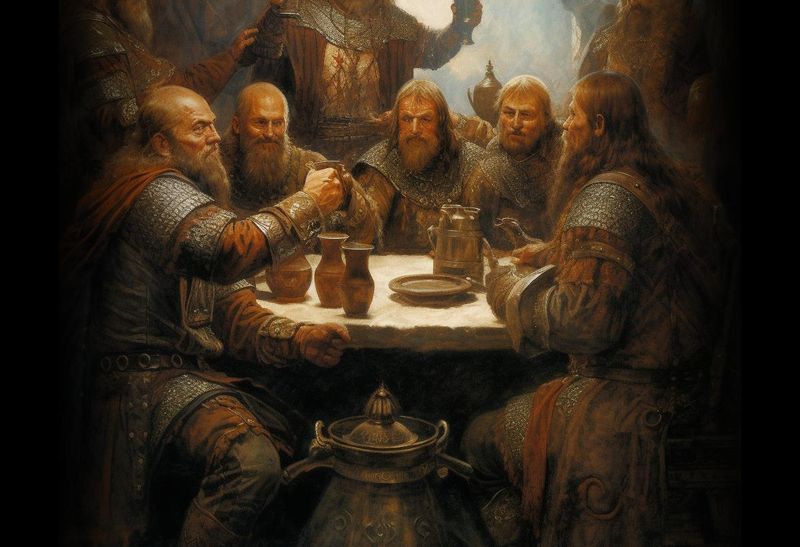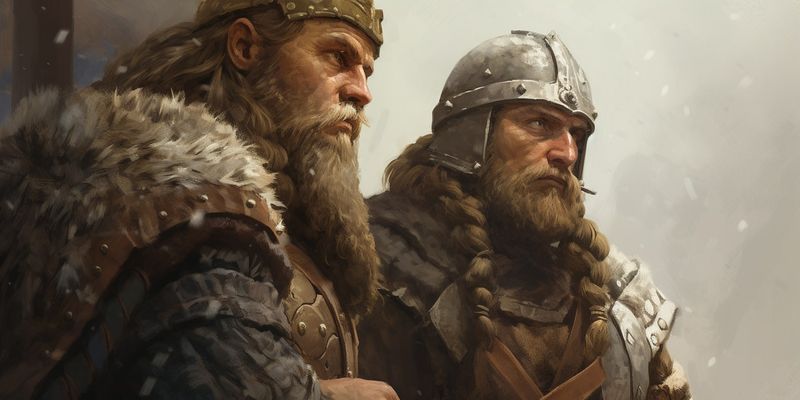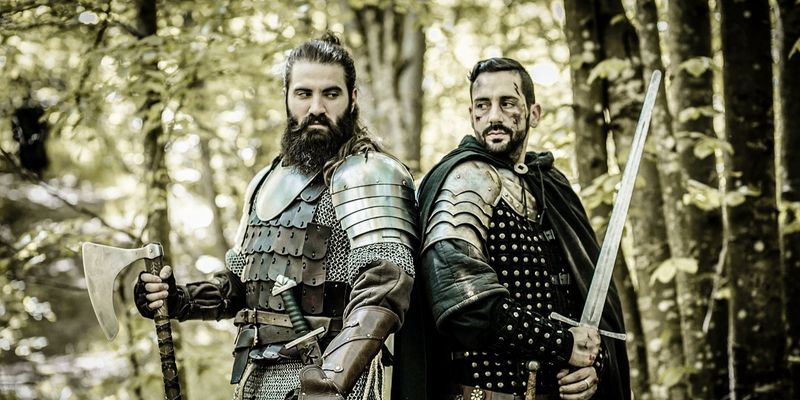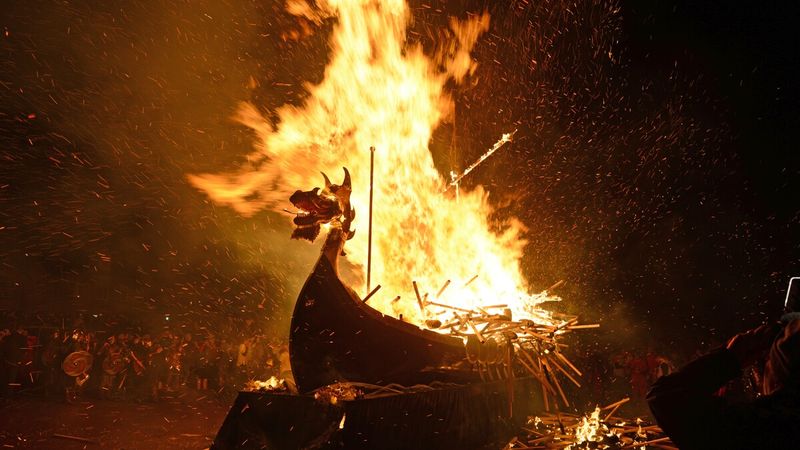The Vikings are often remembered as axe-wielding raiders who struck fear into the heart of Europe. But behind the horned-helmet myth (which, by the way, is historically inaccurate), Norse warriors had a deep respect for wisdom, wit, and the fleeting nature of life. Much of this insight is captured in the Hávamál—an ancient Norse poem packed with proverbs attributed to Odin himself. These Viking sayings reveal a culture rich in practical philosophy, proving that the fiercest warriors also had profound thoughts about honor, time, and human nature. Here are 17 Viking sayings that show they weren’t just fighters—they were thinkers.
1. Cattle die, kinsmen die
A timeless meditation on mortality and legacy. Vikings believed that the only true immortality came from the reputation you left behind. Their lives were a testament to this belief, striving for deeds worthy of song and storytelling.
In a society where oral tradition was paramount, these warriors sought to etch their names into history through acts of bravery and generosity.
Even in the face of inevitable death, the Norse ethos was that one’s legacy could transcend the physical realm, living on in the memories of future generations.
2. The foolish man thinks he will live forever
Courage wasn’t about recklessness—it was about accepting fate and facing death with dignity. In Viking culture, a life lived in fear of death was a life half-lived.
Facing challenges head-on, without fear of the inevitable, was seen as the truest form of bravery. The wise knew that true peace came not from avoiding battle but from embracing one’s destiny.
This saying reminds us that ignoring the certainty of death only leads to regret and unrest in old age.
3. A man’s own house is best
Independence and self-sufficiency were sacred. No matter how humble, a home of one’s own was a source of pride. Vikings valued personal space where they could rule without interference.
The essence of this saying highlights the importance of autonomy and the satisfaction derived from building and maintaining one’s abode.
In a world where community and clan were crucial, having a personal sanctuary was a matter of great prestige and comfort.
4. Better to fight and fall
This wasn’t just about war—it was about choosing bold action over passive existence. A Viking without purpose was already halfway dead.
The essence of this proverb lies in the pursuit of meaning and the courage to chase dreams, regardless of the outcome.
For Vikings, living with purpose was more valuable than mere survival, emphasizing the importance of hope and action in shaping one’s life.
5. Speak useful words or be silent
Brevity was a virtue. Empty talk was a sign of weakness, not wisdom. Vikings cherished meaningful conversation and despised vacuous chatter.
In their world, words had power, and using them wisely was a reflection of character and intellect.
This saying reminds us that silence is often preferable to meaningless noise, valuing thoughtful speech over reckless verbosity.
6. A foolish man lies awake all night
Even Vikings knew the paralysis of anxiety—and the futility of overthinking. In a world fraught with challenges, they understood that worry often led to weariness rather than solutions.
This saying captures the essence of a restless mind, emphasizing the importance of peace and acceptance.
For the Norse, life continued regardless of sleepless nights, urging individuals to focus on action rather than endless rumination.
7. A guest must depart again on his way
Hospitality was sacred, but so was knowing when to move on. Life was a journey, not a destination. Vikings valued both hosting and departing as integral parts of their culture.
This proverb underscores the transient nature of life and the importance of embracing new paths.
In Viking society, respectful farewells were as important as warm welcomes, symbolizing the delicate balance of relationships.
8. Wisdom is welcome wherever it comes from
Truth didn’t need a prestigious source. Even enemies, or the young, could offer insight. Vikings believed in the value of diverse perspectives and respected wisdom in all its forms.
This saying highlights an egalitarian approach to knowledge, where age or status didn’t dictate validity.
It serves as a reminder that wisdom can emerge from unexpected places, enriching those open to listening.
9. No man is so generous he will give all away
A cynical but realistic take on generosity: even good deeds are often driven by ego or ambition. Vikings understood the balance between giving and self-preservation.
This saying reveals a pragmatic approach to generosity, where honor was a currency that could be gained or spent.
It underscores the idea that altruism often comes with an expectation of return, whether in honor or alliances.
10. The unwise man thinks he knows everything
Self-awareness was prized. Boasting was mocked—especially when it came from ignorance. Vikings valued humility and scorned those who overestimated their knowledge.
This saying serves as a caution against arrogance, reminding individuals of the value of continuous learning.
In a society where reputation was key, acknowledging one’s limitations was seen as a strength, not a weakness.
11. Let no man glory in the greatness of his mind
Caution and humility mattered more than showing off. Brains without balance were dangerous. Vikings believed in the power of intellect tempered by restraint.
This proverb warns against pride in one’s intelligence, advocating for an awareness of one’s surroundings and limitations.
In their world, wisdom was measured by actions and understanding, not just cleverness or cunning.
12. The path to a friend’s house is never long
Friendship was a form of wealth. Vikings believed strong bonds were worth effort and distance.
This saying emphasizes the value placed on relationships and the joy found in companionship.
In a world where harsh conditions often tested alliances, nurturing friendships was a key to resilience and happiness.
13. A man’s life is shaped more by his heart than by his fate
While fate (wyrd) was important, personal resolve mattered just as much—if not more. Vikings believed in the power of will to transcend destiny.
This saying highlights the influence of inner strength and conviction in shaping one’s journey.
In Norse culture, heart and courage were seen as forces that could alter the course of one’s life, regardless of predetermined paths.
14. Be wary of a friend’s friend
Loyalty was earned, not assumed. Vikings understood that trust required limits.
This proverb serves as a reminder of the complexities of alliances and the need for vigilance in relationships.
In a society where battles and betrayals were common, discerning true allies from mere acquaintances was crucial for survival.
15. Only a coward sneaks away from a fight
Honor was found in standing your ground—physically or morally. Vikings valued bravery and despised cowardice.
This saying underscores the cultural emphasis on courage and the disdain for those who shunned confrontation.
In their world, facing challenges head-on was not just a matter of pride, but a testament to one’s character and values.
16. The fire seems hottest to the man who stands farthest from it
A poetic way of saying: you can’t judge what you don’t understand from a distance. Vikings valued firsthand experience and direct involvement.
This proverb highlights the importance of proximity and participation in forming true opinions.
In Norse society, wisdom was often gained through direct engagement, reminding individuals to not judge from afar.
17. Praise day at evening
In other words, don’t judge anything—or anyone—too soon. Wisdom comes with experience, not assumption. Vikings believed in the value of time and perspective in making judgments.
This saying encourages patience and a cautious approach to conclusions.
In their tradition, every day’s end brought lessons and insights, urging reflection rather than hasty assessments.
